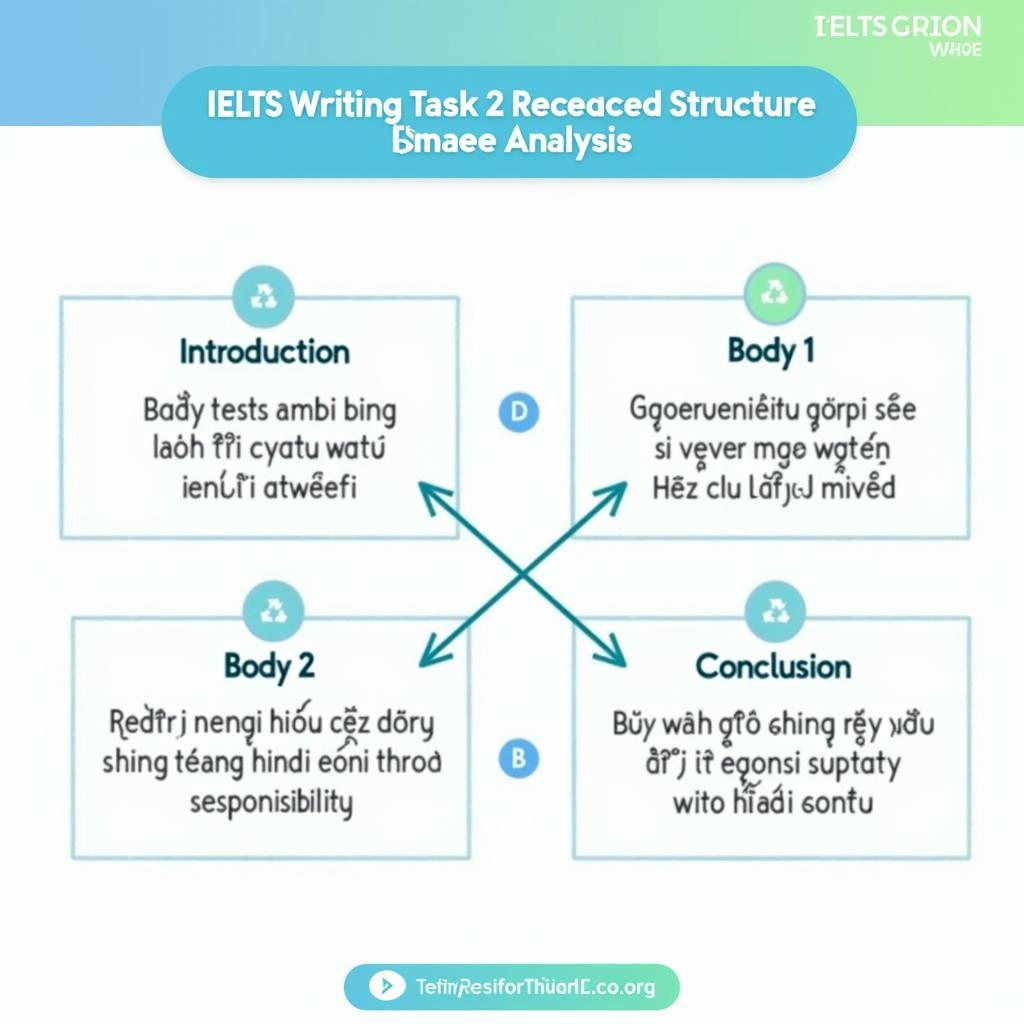Mở bài
Trong bối cảnh cuộc cách mạng công nghiệp 4.0 đang diễn ra mạnh mẽ, chủ đề về vai trò của kỹ năng số (digital skills) trong thị trường việc làm tương lai ngày càng trở nên phổ biến trong kỳ thi IELTS Writing Task 2. Đây là một chủ đề thuộc nhóm Technology và Education, xuất hiện thường xuyên với tần suất khoảng 2-3 lần mỗi năm theo số liệu từ các trung tâm thi IELTS chính thức.
Bài viết này sẽ cung cấp cho bạn kiến thức toàn diện về cách viết một bài luận xuất sắc cho chủ đề này, bao gồm: ba bài mẫu với các band điểm khác nhau (Band 8-9, Band 6.5-7, và Band 5-6), phân tích chi tiết về điểm mạnh và hạn chế của từng bài, từ vựng chuyên ngành quan trọng, và những cấu trúc câu giúp bạn ghi điểm cao.
Một số đề thi thực tế liên quan đã xuất hiện trong các kỳ thi gần đây:
- “Some people believe that schools should focus more on teaching digital skills while others think traditional subjects are more important. Discuss both views and give your opinion.” (British Council, 2023)
- “In the future, all jobs will require digital skills. To what extent do you agree or disagree?” (IDP, 2022)
- “Digital technology is changing the nature of work. What are the advantages and disadvantages of this development?” (Computer-based IELTS, 2023)
Đề Writing Part 2
Some people believe that digital skills will be the most important factor for getting employment in the future. Others think that interpersonal skills will remain more valuable. Discuss both views and give your own opinion.
Dịch đề: Một số người tin rằng kỹ năng số sẽ là yếu tố quan trọng nhất để có được việc làm trong tương lai. Những người khác cho rằng kỹ năng giao tiếp giữa các cá nhân sẽ vẫn có giá trị hơn. Thảo luận cả hai quan điểm và đưa ra ý kiến của bạn.
Phân tích đề bài:
Đây là dạng câu hỏi Discussion + Opinion (Thảo luận hai quan điểm và đưa ra ý kiến cá nhân), một trong những dạng phổ biến nhất trong IELTS Writing Task 2. Đề bài yêu cầu bạn:
- Thảo luận quan điểm 1: Kỹ năng số là yếu tố quan trọng nhất cho việc làm tương lai
- Thảo luận quan điểm 2: Kỹ năng giao tiếp cá nhân vẫn có giá trị hơn
- Đưa ra quan điểm cá nhân: Bạn đồng ý với quan điểm nào hoặc có lập trường cân bằng
Các thuật ngữ quan trọng cần hiểu:
- Digital skills: Kỹ năng liên quan đến công nghệ số, bao gồm lập trình, phân tích dữ liệu, sử dụng phần mềm, v.v.
- Interpersonal skills: Kỹ năng giao tiếp, làm việc nhóm, đồng cảm, thuyết phục
- Most important factor: Yếu tố quan trọng NHẤT (từ khóa này yêu cầu bạn phải so sánh mức độ quan trọng)
Những lỗi thường gặp của học viên Việt Nam:
- Chỉ tập trung vào một quan điểm và bỏ qua quan điểm còn lại
- Đưa ra ý kiến ngay từ đầu bài thay vì giữ đến phần kết luận
- Không phân biệt rõ “discuss” (thảo luận) và “compare” (so sánh)
- Thiếu ví dụ cụ thể để minh họa cho các luận điểm
Cách tiếp cận chiến lược:
- Mở bài: Paraphrase đề bài + Thesis statement (nêu rõ bạn sẽ thảo luận cả hai quan điểm và đưa ra ý kiến)
- Body 1: Phân tích tại sao kỹ năng số quan trọng (2-3 luận điểm với ví dụ)
- Body 2: Phân tích tại sao kỹ năng giao tiếp vẫn có giá trị (2-3 luận điểm với ví dụ)
- Kết bài: Tóm tắt và nêu rõ quan điểm cá nhân (có thể chọn một bên hoặc lập trường cân bằng)
Bài mẫu Band 8-9
Giới thiệu: Bài mẫu Band 8-9 này thể hiện sự thành thạo xuất sắc trong việc phát triển ý tưởng, sử dụng từ vựng học thuật đa dạng, cấu trúc câu phức tạp nhưng tự nhiên, và liên kết mạch lạc giữa các ý. Bài viết không chỉ trả lời đầy đủ yêu cầu mà còn thể hiện sự suy nghĩ sâu sắc về vấn đề.
The rapid digitalization of the workplace has sparked debate about which competencies will be most crucial for future employment. While some argue that digital proficiency will become paramount, others maintain that human-centered interpersonal abilities will retain their primacy. This essay will examine both perspectives before arguing that while technical skills are increasingly essential, interpersonal competencies remain foundational to professional success.
Proponents of digital skills emphasize their growing indispensability across virtually all sectors. As automation and artificial intelligence reshape traditional job roles, employees must demonstrate technological literacy to remain competitive. For instance, even professions once considered immune to digitalization, such as healthcare and education, now require practitioners to navigate sophisticated software systems, analyze data analytics, and engage with digital platforms. Furthermore, the proliferation of remote work has intensified demand for digital collaboration tools, making technological competence not merely advantageous but obligatory. Companies increasingly seek candidates who can adapt to emerging technologies, suggesting that digital fluency has become a prerequisite rather than a bonus qualification.
However, interpersonal skills retain irreplaceable value in the modern workplace precisely because they complement rather than compete with technology. Leadership, emotional intelligence, and effective communication remain distinctly human capabilities that machines cannot replicate. Research by the World Economic Forum indicates that critical thinking, problem-solving, and people management consistently rank among the most sought-after competencies, regardless of technological advancement. Moreover, as workplaces become more diverse and globally interconnected, the ability to navigate cultural differences, build consensus, and inspire teams becomes increasingly crucial. While algorithms can process information, they cannot foster trust, negotiate complex stakeholder relationships, or provide the empathetic leadership that drives organizational success.
In conclusion, although digital skills are undeniably essential for navigating tomorrow’s job market, interpersonal abilities provide the human foundation upon which technological competence becomes truly effective. The most successful professionals will likely be those who combine digital fluency with strong interpersonal capabilities, creating a synergy between technological and human skills that neither alone can achieve.
Phân tích Band điểm
| Tiêu chí | Band | Nhận xét |
|---|---|---|
| Task Response (Hoàn thành yêu cầu) | 9 | Bài viết trả lời đầy đủ và xuất sắc cả hai phần của câu hỏi. Quan điểm cá nhân được nêu rõ ràng ngay từ mở bài và được phát triển xuyên suốt bài. Các ý tưởng được mở rộng đầy đủ với ví dụ cụ thể và lập luận thuyết phục. |
| Coherence & Cohesion (Mạch lạc & Liên kết) | 9 | Bài viết có cấu trúc logic hoàn hảo với sự chuyển tiếp tự nhiên giữa các đoạn. Sử dụng đa dạng các từ nối (“While”, “However”, “Furthermore”, “Moreover”) một cách tinh tế. Mỗi đoạn có câu chủ đề rõ ràng và các câu hỗ trợ liên kết chặt chẽ. |
| Lexical Resource (Từ vựng) | 9 | Từ vựng phong phú, chính xác và phù hợp với ngữ cảnh học thuật (“indispensability”, “proliferation”, “prerequisite”, “synergy”). Collocations tự nhiên (“retain primacy”, “navigate cultural differences”, “foster trust”). Không có lỗi từ vựng. |
| Grammatical Range & Accuracy (Ngữ pháp) | 9 | Sử dụng đa dạng cấu trúc câu phức (mệnh đề quan hệ, câu điều kiện, cụm phân từ). Ngữ pháp chính xác hoàn toàn. Câu văn phức tạp nhưng vẫn rõ ràng và tự nhiên (“precisely because they complement rather than compete with technology”). |
Các yếu tố giúp bài này được chấm điểm cao
-
Thesis statement mạnh mẽ và cân bằng: Ngay trong đoạn mở bài, tác giả đã nêu rõ lập trường – thừa nhận tầm quan trọng của cả hai nhưng cho rằng kỹ năng giao tiếp là nền tảng. Điều này cho thấy khả năng tư duy phản biện và không thiên vị.
-
Phát triển ý tưởng có chiều sâu: Thay vì chỉ liệt kê ý, bài viết giải thích tại sao và như thế nào. Ví dụ, không chỉ nói “digital skills quan trọng” mà giải thích cụ thể qua ví dụ về healthcare và education.
-
Sử dụng bằng chứng cụ thể: Tham chiếu đến World Economic Forum tạo độ tin cậy cho lập luận. Đây là cách tiếp cận học thuật được đánh giá cao.
-
Liên kết logic giữa các đoạn: Đoạn body 2 bắt đầu bằng “However” và cụm từ “precisely because they complement rather than compete” tạo sự đối lập tinh tế, không đơn thuần là phủ định quan điểm trước đó.
-
Từ vựng học thuật chính xác: Các cụm như “retain their primacy”, “digital fluency”, “irreplaceable value” thể hiện vốn từ vựng phong phú và sử dụng đúng ngữ cảnh.
-
Kết bài tổng hợp và thăng hoa: Không chỉ lặp lại ý mà đưa ra một góc nhìn mới – sự kết hợp (synergy) giữa hai loại kỹ năng mới là lý tưởng nhất.
-
Tránh được các lỗi phổ biến: Không có câu văn quá dài khó hiểu, không lặp từ, không có lỗi ngữ pháp hay chính tả, và không sử dụng ngôn ngữ quá khoa trương gây phản tác dụng.
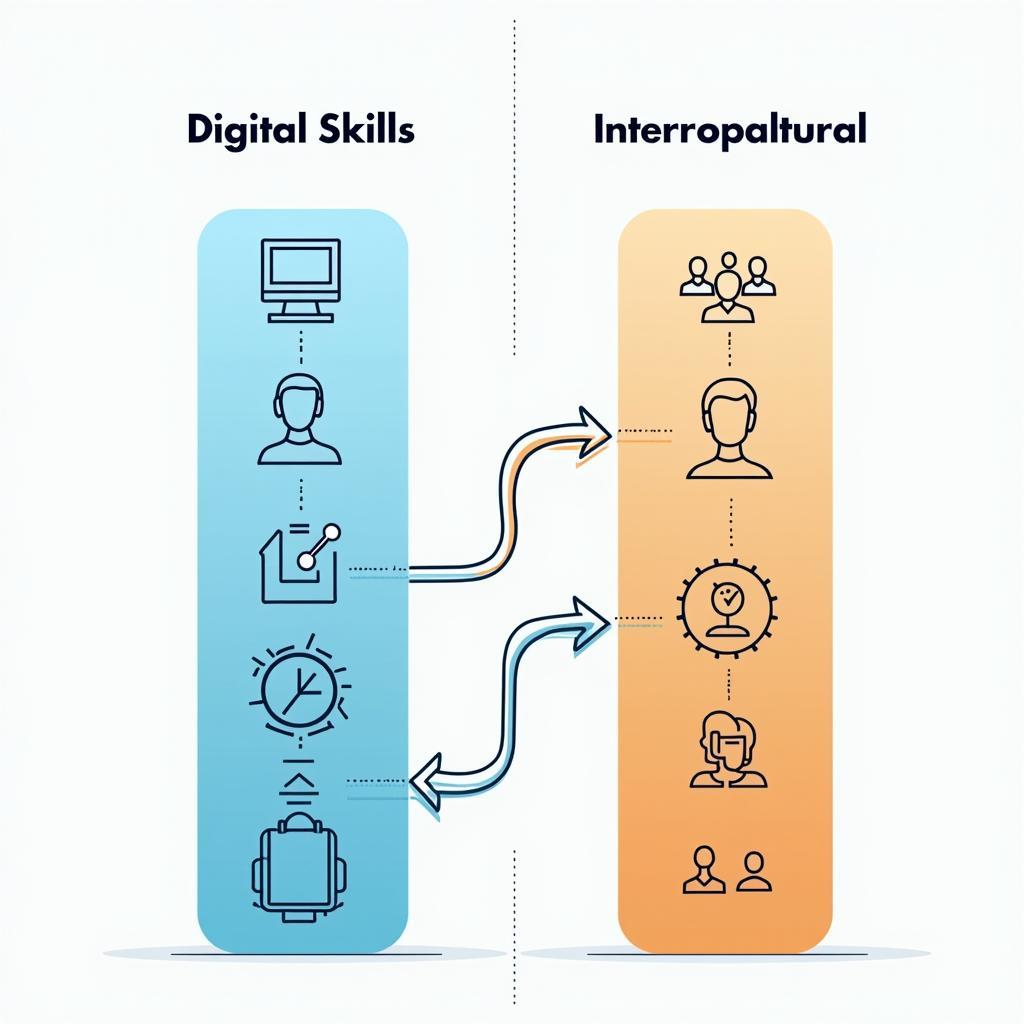 Biểu đồ so sánh tầm quan trọng của kỹ năng số và kỹ năng giao tiếp trong thị trường việc làm tương lai theo đánh giá của các nhà tuyển dụng
Biểu đồ so sánh tầm quan trọng của kỹ năng số và kỹ năng giao tiếp trong thị trường việc làm tương lai theo đánh giá của các nhà tuyển dụng
Bài mẫu Band 6.5-7
Giới thiệu: Bài mẫu Band 6.5-7 này thể hiện khả năng viết tốt với ý tưởng rõ ràng và cấu trúc hợp lý. Tuy nhiên, độ phức tạp của từ vựng và cấu trúc câu chưa đạt đến mức xuất sắc như bài Band 8-9.
In today’s world, there is a debate about whether digital skills or interpersonal skills are more important for getting jobs in the future. Some people think that digital skills will be the most crucial factor, while others believe that interpersonal skills are more valuable. This essay will discuss both views and give my opinion.
On the one hand, digital skills are becoming increasingly important in the modern workplace. Many jobs nowadays require employees to use computers and various software programs. For example, in offices, workers need to know how to use Microsoft Office, email systems, and other digital tools to complete their tasks efficiently. Additionally, as technology continues to develop, new jobs related to artificial intelligence and data analysis are being created. People who have strong digital skills will have more job opportunities because companies are looking for workers who can adapt to new technologies. Furthermore, during the COVID-19 pandemic, many companies moved to online work, which showed that digital skills are essential for working from home.
On the other hand, interpersonal skills remain very important in the workplace. Good communication skills help employees work effectively with their colleagues and clients. For instance, managers need to be able to motivate their team members and solve conflicts, which requires strong interpersonal abilities. Moreover, some jobs like teaching, nursing, and customer service heavily rely on human interaction. These professions need workers who can understand people’s emotions and build relationships, something that technology cannot replace. Even in technical fields, employees need to explain complex ideas to non-technical people, which requires excellent communication skills.
In my opinion, both digital skills and interpersonal skills are important for future employment, but interpersonal skills may be slightly more valuable. This is because while digital skills can be learned through training courses, interpersonal skills take longer to develop and are harder to teach. Companies can train their employees to use new software, but it is more difficult to teach someone how to be a good communicator or leader.
In conclusion, although digital skills are necessary for many modern jobs, interpersonal skills are equally, if not more, important for career success. The ideal employee in the future will probably need to have both types of skills to succeed in the competitive job market.
Phân tích Band điểm
| Tiêu chí | Band | Nhận xét |
|---|---|---|
| Task Response (Hoàn thành yêu cầu) | 7 | Bài viết trả lời đầy đủ cả hai phần câu hỏi với quan điểm rõ ràng. Các ý tưởng được phát triển hợp lý với ví dụ cụ thể. Tuy nhiên, độ sâu phân tích chưa bằng bài Band 8-9 và thiếu sự tinh tế trong lập luận. |
| Coherence & Cohesion (Mạch lạc & Liên kết) | 7 | Cấu trúc bài rõ ràng với các đoạn văn được tổ chức logic. Sử dụng từ nối cơ bản hiệu quả (“On the one hand”, “Additionally”, “Moreover”). Tuy nhiên, sự chuyển tiếp giữa các ý chưa mượt mà như bài Band 8-9. |
| Lexical Resource (Từ vựng) | 6.5 | Từ vựng đủ để truyền đạt ý tưởng nhưng chưa đa dạng và tinh tế. Có một số collocations tốt nhưng còn lặp từ (“important” xuất hiện nhiều lần). Thiếu từ vựng học thuật nâng cao. |
| Grammatical Range & Accuracy (Ngữ pháp) | 7 | Sử dụng kết hợp câu đơn và câu phức một cách chính xác. Có một số cấu trúc phức tạp nhưng chưa đa dạng. Ngữ pháp chính xác với ít lỗi không đáng kể. |
So sánh với bài Band 8-9
1. Độ phức tạp của thesis statement:
- Band 8-9: “while technical skills are increasingly essential, interpersonal competencies remain foundational to professional success” – Thể hiện lập trường cân bằng và tinh tế
- Band 6.5-7: “This essay will discuss both views and give my opinion” – Rõ ràng nhưng còn đơn giản, không thể hiện quan điểm ngay từ đầu
2. Phát triển ý tưởng:
- Band 8-9: Giải thích sâu về “why” và “how”, ví dụ: “precisely because they complement rather than compete with technology”
- Band 6.5-7: Tập trung vào “what”, ví dụ đơn giản hơn như “workers need to know how to use Microsoft Office”
3. Từ vựng:
- Band 8-9: “indispensability”, “proliferation”, “synergy”, “paramount”
- Band 6.5-7: “important”, “necessary”, “essential” – từ vựng cơ bản hơn, có lặp lại
4. Cấu trúc câu:
- Band 8-9: Nhiều câu phức tạp với mệnh đề phụ thuộc, cụm phân từ, đảo ngữ
- Band 6.5-7: Chủ yếu là câu phức đơn giản với “because”, “which”, “that”
5. Liên kết:
- Band 8-9: Sử dụng các từ nối tinh tế như “However”, “Furthermore”, với sự chuyển tiếp tự nhiên
- Band 6.5-7: Sử dụng từ nối cơ bản và dễ nhận biết hơn như “On the one hand”, “Additionally”
6. Kết bài:
- Band 8-9: Tổng hợp và đưa ra góc nhìn mới về “synergy”
- Band 6.5-7: Tóm tắt lại các ý chính một cách trực tiếp
Bài mẫu Band 5-6
Giới thiệu: Bài mẫu Band 5-6 này thể hiện khả năng viết cơ bản với ý tưởng đơn giản. Bài viết có một số lỗi ngữ pháp, từ vựng hạn chế, và cách phát triển ý còn chưa sâu sắc – những đặc điểm phổ biến của học viên ở trình độ này.
Nowadays, many people think that digital skills is the most important thing to get a job in the future. But other people think that interpersonal skills is more important. In this essay, I will discuss both of these ideas and give my opinion.
First, digital skills are very important today. Many companies use computers and technology for their work. If people don’t have digital skills, they cannot do their job good. For example, in my country, many offices use computer programs like Word and Excel. Workers must know how to use these programs. Also, there are many new jobs about technology now, such as programming and website design. These jobs need people who are good at technology. So I think digital skills are important for finding job.
Second, interpersonal skills also important for work. When people work in a company, they need to talk with other people. Good communication help them work together better. For example, if someone is a manager, they must can talk to their workers and explain things clearly. Some jobs like teacher or doctor need to communicate with many people every day. If they don’t have good interpersonal skills, they cannot do their job well. So interpersonal skills are also very necessary.
In my opinion, I think both skills are important. Digital skills help people use technology and interpersonal skills help people work with others. In the future, I think people need to have both skills to get good job. If someone only have one skill, it will be difficult for them to find work.
In conclusion, digital skills and interpersonal skills are both important for future jobs. People should learn both of them to be successful in their career. Companies want workers who can use technology and also can work well with other people.
Phân tích Band điểm
| Tiêu chí | Band | Nhận xét |
|---|---|---|
| Task Response (Hoàn thành yêu cầu) | 6 | Bài viết đề cập đến cả hai quan điểm và có nêu ý kiến cá nhân. Tuy nhiên, các ý tưởng được phát triển còn đơn giản, thiếu chi tiết cụ thể và độ sâu. Ví dụ còn chung chung và không được giải thích kỹ. |
| Coherence & Cohesion (Mạch lạc & Liên kết) | 5.5 | Có cấu trúc cơ bản với mở bài, thân bài và kết bài. Sử dụng một số từ nối đơn giản (“First”, “Second”, “Also”) nhưng còn cứng nhắc. Một số đoạn văn chưa có câu chủ đề rõ ràng. Thiếu sự liên kết mượt mà giữa các câu. |
| Lexical Resource (Từ vựng) | 5.5 | Từ vựng hạn chế với nhiều từ lặp lại (“important”, “good”, “people”). Có một số lỗi word choice và collocation không tự nhiên. Thiếu từ vựng học thuật và paraphrase yếu. |
| Grammatical Range & Accuracy (Ngữ pháp) | 5.5 | Chủ yếu sử dụng câu đơn và câu phức đơn giản. Có nhiều lỗi ngữ pháp ảnh hưởng đến ý nghĩa: lỗi chia động từ (“is” thay vì “are”), lỗi từ loại (“good” thay vì “well”), lỗi modal verb (“must can”). Tuy nhiên, ý nghĩa chung vẫn được truyền đạt. |
Những lỗi sai của bài – phân tích & giải thích
| Lỗi sai | Loại lỗi | Sửa lại | Giải thích |
|---|---|---|---|
| “digital skills is” | Subject-verb agreement | “digital skills are” | “Skills” là danh từ số nhiều nên động từ phải dùng “are” chứ không phải “is”. Đây là lỗi phổ biến của học viên Việt vì tiếng Việt không có sự chia động từ theo số. |
| “cannot do their job good” | Word form (từ loại) | “cannot do their job well” | Sau động từ “do” cần dùng trạng từ “well” chứ không phải tính từ “good”. Học viên Việt thường nhầm lẫn giữa tính từ và trạng từ. |
| “also important” | Missing verb | “are also important” | Thiếu động từ “are”. Mỗi câu tiếng Anh cần có động từ chính, đây là quy tắc cơ bản về cấu trúc câu. |
| “they must can talk” | Modal verb error | “they must be able to talk” hoặc “they should be able to talk” | Không thể dùng hai modal verbs (“must” và “can”) cạnh nhau. Cần dùng cấu trúc “must be able to” hoặc chọn một modal verb phù hợp. |
| “to get good job” | Missing article | “to get a good job” | Thiếu mạo từ “a” trước danh từ đếm được số ít. Lỗi về mạo từ là một trong những lỗi phổ biến nhất của học viên Việt Nam. |
| “only have one skill” | Verb tense | “only has one skill” | Chủ ngữ “someone” là số ít nên động từ phải là “has” chứ không phải “have”. |
| “interpersonal skills is more important” | Subject-verb agreement | “interpersonal skills are more important” | Tương tự lỗi đầu tiên, “skills” số nhiều cần động từ “are”. |
| “to be successful in their career” | Tense consistency | “to be successful in their careers” | Nên dùng “careers” số nhiều để tương ứng với “people” (số nhiều) ở phần trước. |
Cách Cải Thiện Từ Band 6 Lên Band 7
1. Mở rộng từ vựng:
- Thay vì: “very important” → Dùng: “crucial”, “essential”, “vital”, “indispensable”
- Thay vì: “good” → Dùng: “proficient”, “competent”, “skilled”
- Thay vì: “many people” → Dùng: “numerous individuals”, “a significant number of professionals”
2. Phát triển ý tưởng sâu hơn:
- Không chỉ nói “Digital skills are important” mà giải thích tại sao và hậu quả nếu không có: “Digital literacy has become essential because organizations increasingly rely on automated systems and data-driven decision-making. Without these competencies, employees risk becoming obsolete in a rapidly evolving job market.”
3. Sử dụng ví dụ cụ thể hơn:
- Thay vì: “Many offices use computer programs”
- Dùng: “For instance, healthcare professionals must now navigate electronic health records systems, while educators utilize learning management platforms to deliver online courses”
4. Cải thiện cấu trúc câu:
- Câu đơn giản: “Digital skills are important. They help people get jobs.”
- Câu phức tạp hơn: “Digital skills are increasingly important as they enable individuals to adapt to technological innovations, thereby enhancing their employability in competitive markets.”
5. Sử dụng linking words tinh tế hơn:
- Thay vì: “First”, “Second”, “Also”
- Dùng: “To begin with”, “Furthermore”, “Moreover”, “In addition to this”, “Consequently”
6. Tránh lặp từ bằng cách paraphrase:
- Lần 1: “digital skills”
- Lần 2: “technological competencies”
- Lần 3: “technical proficiency”
- Lần 4: “digital literacy”
7. Kiểm tra kỹ ngữ pháp cơ bản:
- Subject-verb agreement (chủ ngữ – động từ hòa hợp)
- Mạo từ a/an/the
- Giới từ (in, on, at, for, with)
- Chia động từ đúng thì
- Số ít/số nhiều của danh từ
8. Thực hành viết câu chủ đề mạnh:
- Yếu: “Digital skills are very important today.”
- Mạnh hơn: “The digitalization of the workplace has rendered technological competence a prerequisite for employment across virtually all industries.”
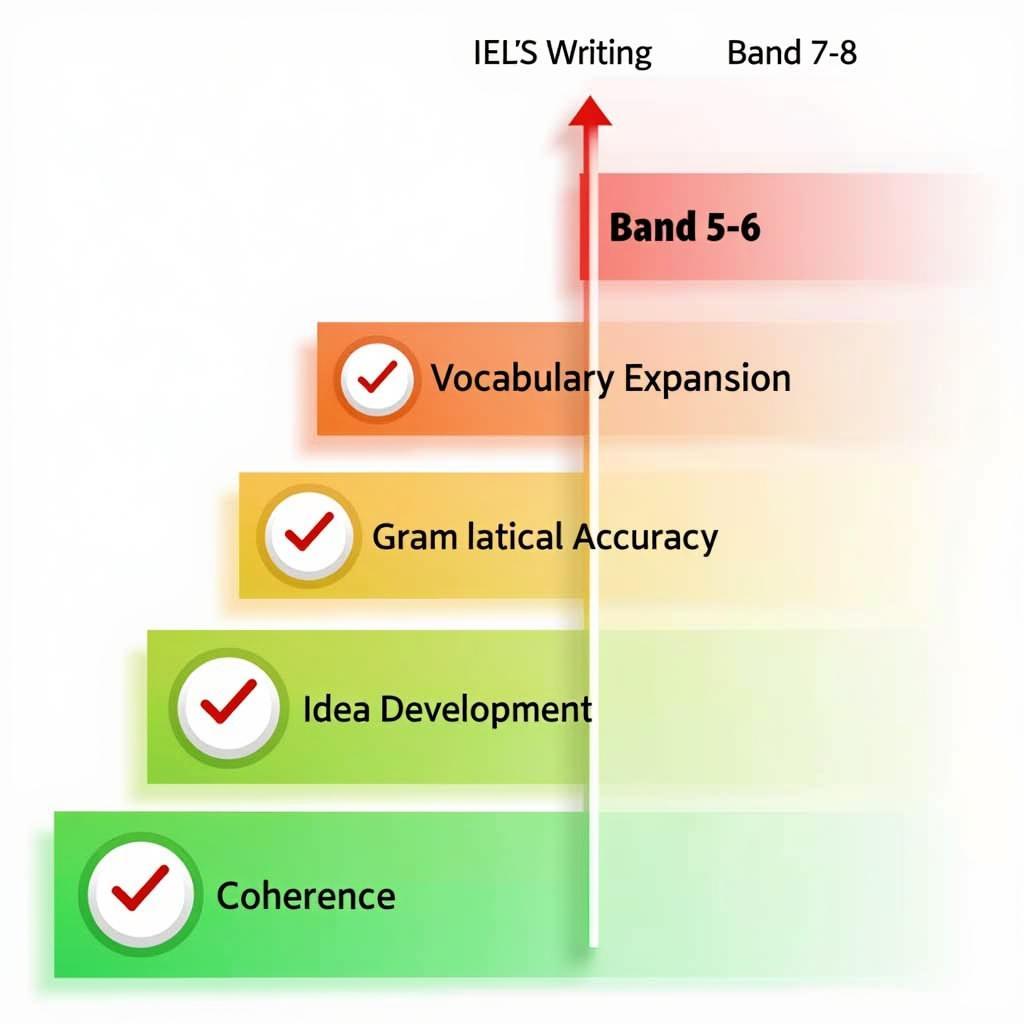 Lộ trình cải thiện từ Band 5-6 lên Band 7-8 trong IELTS Writing Task 2 với các bước cụ thể về từ vựng ngữ pháp và phát triển ý
Lộ trình cải thiện từ Band 5-6 lên Band 7-8 trong IELTS Writing Task 2 với các bước cụ thể về từ vựng ngữ pháp và phát triển ý
Từ vựng quan trọng cần nhớ
| Từ/Cụm từ | Loại từ | Phiên âm | Nghĩa tiếng Việt | Ví dụ | Collocations |
|---|---|---|---|---|---|
| digital proficiency | noun phrase | /ˈdɪdʒɪtl prəˈfɪʃənsi/ | Sự thành thạo về công nghệ số | Digital proficiency is now a basic requirement for most office positions. | demonstrate/develop/enhance digital proficiency |
| interpersonal competencies | noun phrase | /ˌɪntəˈpɜːsənl ˌkɒmpɪˈtensiz/ | Năng lực giao tiếp giữa các cá nhân | Strong interpersonal competencies enable employees to collaborate effectively. | possess/cultivate/demonstrate interpersonal competencies |
| indispensability | noun | /ˌɪndɪˌspensəˈbɪləti/ | Tính không thể thiếu | The indispensability of technical skills in modern workplaces cannot be overstated. | recognize/emphasize/acknowledge the indispensability of |
| proliferation | noun | /prəˌlɪfəˈreɪʃn/ | Sự gia tăng nhanh chóng | The proliferation of remote work has changed hiring practices. | rapid proliferation, the proliferation of technology/digital tools |
| paramount | adjective | /ˈpærəmaʊnt/ | Tối quan trọng, hàng đầu | Communication skills are paramount in customer-facing roles. | be of paramount importance, paramount concern/priority |
| irreplaceable | adjective | /ˌɪrɪˈpleɪsəbl/ | Không thể thay thế | Human empathy remains irreplaceable in healthcare professions. | truly/virtually/absolutely irreplaceable |
| technological literacy | noun phrase | /ˌteknəˈlɒdʒɪkl ˈlɪtərəsi/ | Khả năng hiểu biết và sử dụng công nghệ | Technological literacy has become as fundamental as reading and writing. | basic/advanced technological literacy, improve/develop technological literacy |
| foster trust | verb phrase | /ˈfɒstə trʌst/ | Xây dựng lòng tin | Effective leaders know how to foster trust within their teams. | foster trust and collaboration, help foster/serve to foster |
| synergy | noun | /ˈsɪnədʒi/ | Sự hiệp lực, tác động tổng hợp | The synergy between technical and soft skills creates exceptional professionals. | create/achieve/demonstrate synergy, synergy between |
| prerequisite | noun | /priːˈrekwɪzɪt/ | Điều kiện tiên quyết | A bachelor’s degree is often a prerequisite for managerial positions. | essential/necessary prerequisite, prerequisite for employment/success |
| navigate | verb | /ˈnævɪɡeɪt/ | Điều hướng, vượt qua (khó khăn) | Professionals must navigate complex software systems daily. | navigate challenges/systems/platforms, successfully navigate |
| retain primacy | verb phrase | /rɪˈteɪn ˈpraɪməsi/ | Giữ vị trí ưu tiên | Interpersonal skills retain primacy in leadership roles. | continue to retain, retain primacy over |
| complement | verb | /ˈkɒmplɪment/ | Bổ sung, làm hoàn thiện | Digital skills complement rather than replace human abilities. | complement each other, effectively complement |
| foundational | adjective | /faʊnˈdeɪʃənl/ | Thuộc về nền tảng, cơ bản | Communication remains foundational to all professional success. | foundational skills/knowledge, foundational to |
| obsolete | adjective | /ˈɒbsəliːt/ | Lỗi thời, cũ kỹ | Workers without digital skills risk becoming obsolete. | become/render obsolete, obsolete technology/skills |
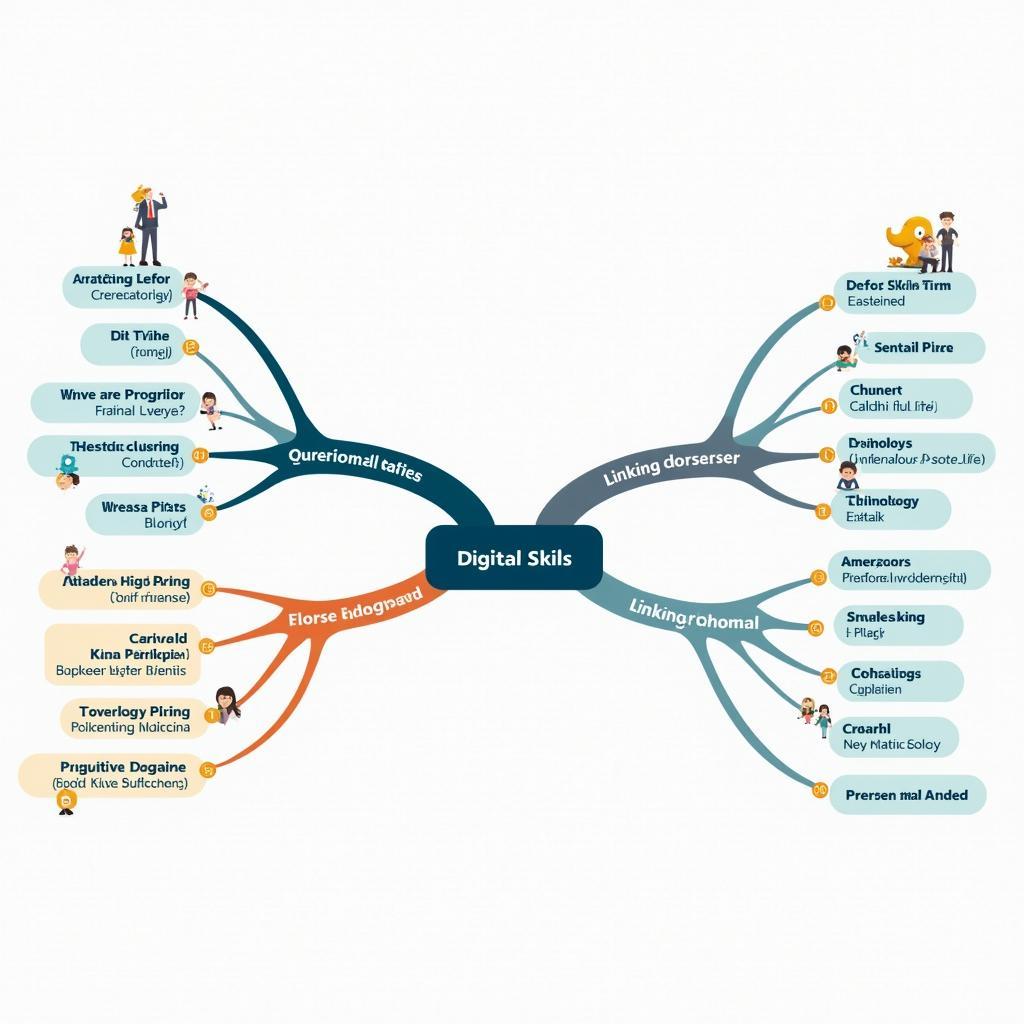 Bộ từ vựng chủ đề kỹ năng số và kỹ năng mềm cho IELTS Writing Task 2 được sắp xếp theo nhóm chủ đề với ví dụ minh họa
Bộ từ vựng chủ đề kỹ năng số và kỹ năng mềm cho IELTS Writing Task 2 được sắp xếp theo nhóm chủ đề với ví dụ minh họa
Cấu trúc câu dễ ăn điểm cao
1. Mệnh đề nhượng bộ với While (Concessive Clause)
Công thức: While + clause 1 (thừa nhận điểm này), clause 2 (nhấn mạnh điểm chính)
Ví dụ từ bài Band 8-9:
While some argue that digital proficiency will become paramount, others maintain that human-centered interpersonal abilities will retain their primacy.
Tại sao cấu trúc này ghi điểm cao:
Cấu trúc này thể hiện khả năng nhìn nhận vấn đề từ nhiều góc độ, một kỹ năng tư duy phản biện được đánh giá cao trong IELTS. Nó cho phép bạn thừa nhận một quan điểm trước khi đưa ra lập luận chính, tạo sự cân bằng và khách quan trong bài viết. Đây là dấu hiệu của một người viết trưởng thành về mặt học thuật.
Ví dụ bổ sung:
- While technological advancement has revolutionized workplace efficiency, human judgment remains essential for strategic decision-making.
- While digital tools facilitate communication, they cannot replicate the nuances of face-to-face interaction.
- While automation may replace routine tasks, it simultaneously creates demand for higher-level analytical skills.
Lỗi thường gặp của học viên Việt Nam:
- Dùng “Although” và “but” cùng lúc: ❌ “Although digital skills are important, but interpersonal skills are more valuable.” (Chỉ dùng một trong hai)
- Nhầm lẫn giữa “while” (trong khi) và “meanwhile” (trong lúc đó): ❌ “Meanwhile some people think…” (Phải dùng “While”)
2. Cụm phân từ (Participle Phrases)
Công thức: Present participle (-ing) / Past participle (-ed) + clause, main clause
Ví dụ từ bài Band 8-9:
Research by the World Economic Forum indicates that critical thinking, problem-solving, and people management consistently rank among the most sought-after competencies, regardless of technological advancement.
Hoặc dạng khác: Proponents of digital skills emphasize their growing indispensability across virtually all sectors.
Tại sao cấu trúc này ghi điểm cao:
Cụm phân từ giúp câu văn súc tích và tinh tế hơn, thể hiện khả năng sử dụng ngữ pháp nâng cao. Nó kết hợp hai mệnh đề một cách mượt mà, tạo nhịp điệu tự nhiên cho bài viết và tránh lặp lại cấu trúc câu đơn giản.
Ví dụ bổ sung:
- Recognizing the importance of digital literacy, many educational institutions have incorporated coding into their curriculum.
- Driven by technological innovation, the job market has witnessed unprecedented transformation.
- Having mastered both technical and interpersonal skills, successful professionals can adapt to diverse workplace challenges.
Lỗi thường gặp của học viên Việt Nam:
- Dangling modifier (chủ ngữ không khớp): ❌ “Working on the project, the computer suddenly crashed.” → ✅ “Working on the project, I experienced a computer crash.”
- Dùng sai thì của participle: ❌ “Finished the work, he went home.” → ✅ “Having finished the work, he went home.”
3. Mệnh đề quan hệ không xác định (Non-defining Relative Clause)
Công thức: Subject + verb, which/who + bổ sung thông tin, verb
Ví dụ từ bài Band 8-9:
Companies increasingly seek candidates who can adapt to emerging technologies, suggesting that digital fluency has become a prerequisite rather than a bonus qualification.
Tại sao cấu trúc này ghi điểm cao:
Mệnh đề quan hệ không xác định giúp bạn bổ sung thông tin phụ một cách tự nhiên mà không làm gián đoạn luồng ý chính. Việc sử dụng dấu phзапу thể hiện khả năng punctuation (dấu câu) chính xác – một yếu tố quan trọng trong tiêu chí Grammatical Range and Accuracy.
Ví dụ bổ sung:
- Automation, which has transformed manufacturing industries, now extends to service sectors as well.
- Emotional intelligence, which cannot be replicated by machines, remains crucial in leadership positions.
- The pandemic, which accelerated digital transformation, has permanently altered workplace expectations.
Lỗi thường gặp của học viên Việt Nam:
- Quên dấu phẩy: ❌ “Automation which has transformed industries now extends…” → ✅ “Automation, which has transformed industries, now extends…”
- Nhầm lẫn defining và non-defining: “The skills which are needed…” (defining – không dấu phẩy) vs “Communication skills, which are essential,…” (non-defining – có dấu phẩy)
4. Câu chẻ nhấn mạnh (Cleft Sentences – It is/was… that/who)
Công thức: It is/was + yếu tố nhấn mạnh + that/who + phần còn lại
Ví dụ tương tự bài Band 8-9:
“It is the combination of technical expertise and interpersonal abilities that distinguishes exceptional professionals from merely competent ones.”
Tại sao cấu trúc này ghi điểm cao:
Câu chẻ tạo sự nhấn mạnh mạnh mẽ vào một phần cụ thể của câu, giúp làm nổi bật luận điểm quan trọng. Đây là công cụ hùng hồn trong viết học thuật, thể hiện khả năng điều khiển cấu trúc câu để tạo hiệu quả tu từ.
Ví dụ bổ sung:
- It is interpersonal skills, rather than technical knowledge alone, that enable professionals to lead effectively.
- It was the advent of remote work that revealed the critical importance of digital collaboration tools.
- It is through continuous learning that employees can remain relevant in evolving industries.
Lỗi thường gặp của học viên Việt Nam:
- Dùng sai “that” và “who”: ❌ “It is the employees that work…” → ✅ “It is the employees who work…”
- Cấu trúc không hoàn chỉnh: ❌ “It is important that digital skills.” → ✅ “It is digital skills that have become important.”
5. Câu điều kiện phức tạp (Mixed Conditionals & Inversion)
Công thức: Should/Were/Had + subject + verb, main clause
Ví dụ ứng dụng:
“Were companies to prioritize only technical skills in hiring, they would overlook candidates with valuable interpersonal competencies.”
“Should automation continue at the current pace, many traditional jobs will require significant upskilling.”
Tại sao cấu trúc này ghi điểm cao:
Đảo ngữ trong câu điều kiện là dấu hiệu của trình độ ngữ pháp cao cấp. Nó tạo tính trang trọng cho văn phong học thuật và cho thấy bạn có khả năng vận dụng các biến thể ngữ pháp phức tạp một cách chính xác.
Ví dụ bổ sung:
- Were interpersonal skills to be neglected in education, future workforces would lack essential collaborative abilities.
- Had digital transformation occurred more gradually, workers would have had more time to adapt.
- Should employers recognize the complementary nature of both skill sets, they would hire more balanced candidates.
Lỗi thường gặp của học viên Việt Nam:
- Quên đảo ngữ: ❌ “If companies should prioritize…” → ✅ “Should companies prioritize…”
- Nhầm lẫn thì động từ: ❌ “Were companies prioritize…” → ✅ “Were companies to prioritize…”
6. Cấu trúc so sánh phức hợp (Complex Comparative Structures)
Công thức: The + comparative + subject + verb, the + comparative + subject + verb
Ví dụ ứng dụng:
“The more automated workplaces become, the more essential human skills like empathy and creativity will be.”
“The faster technology evolves, the greater the need for continuous professional development becomes.”
Tại sao cấu trúc này ghi điểm cao:
Cấu trúc so sánh kép thể hiện mối quan hệ nhân quả phức tạp giữa hai yếu tố, cho thấy khả năng phân tích logic sâu sắc. Đây là dấu hiệu của tư duy phản biện – một kỹ năng được đánh giá cao trong Task Response.
Ví dụ bổ sung:
- The more companies rely on digital platforms, the more crucial cybersecurity skills become.
- The better employees balance technical and soft skills, the more valuable they are to organizations.
- The more diverse the workforce, the more important intercultural communication becomes.
Lỗi thường gặp của học viên Việt Nam:
- Quên “the” ở mệnh đề thứ hai: ❌ “The more automated workplaces become, more essential human skills will be.” → ✅ “…the more essential…”
- Dùng sai cấu trúc so sánh: ❌ “The more automated, the most essential…” → ✅ “…the more essential…”
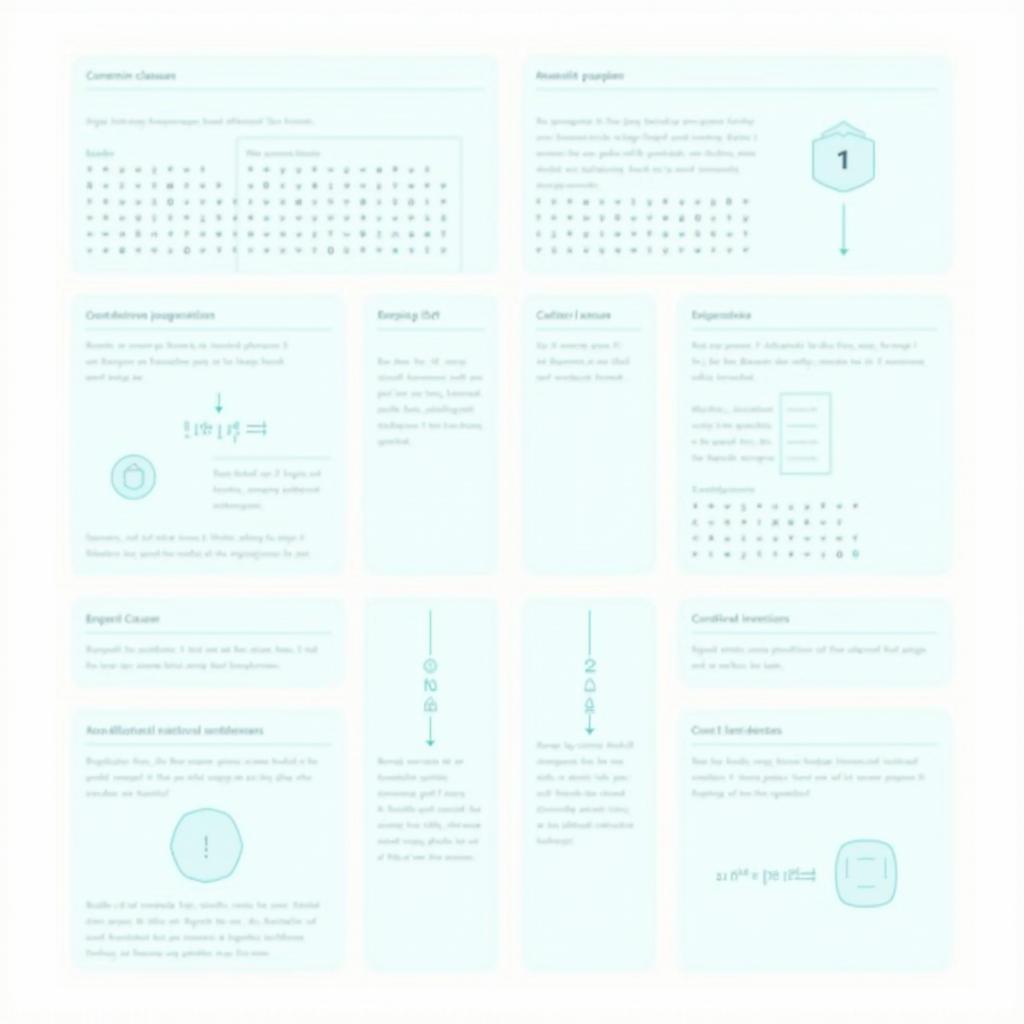 Sáu cấu trúc câu nâng cao giúp đạt Band 8-9 trong IELTS Writing Task 2 với ví dụ minh họa và công thức ngữ pháp
Sáu cấu trúc câu nâng cao giúp đạt Band 8-9 trong IELTS Writing Task 2 với ví dụ minh họa và công thức ngữ pháp
Kết bài
Chủ đề về vai trò của kỹ năng số trong thị trường việc làm tương lai không chỉ là một đề tài phổ biến trong IELTS Writing Task 2 mà còn phản ánh thực tế đang diễn ra trong thế giới hiện đại. Qua ba bài mẫu với các band điểm khác nhau, bạn có thể thấy rõ những yếu tố quan trọng tạo nên sự khác biệt giữa một bài viết xuất sắc và một bài viết trung bình.
Những điểm then chốt cần ghi nhớ:
Để đạt Band 8-9, bạn cần thể hiện khả năng phân tích sâu sắc với các ý tưởng được phát triển đầy đủ, sử dụng từ vựng học thuật đa dạng nhưng tự nhiên, và vận dụng các cấu trúc câu phức tạp một cách chính xác. Bài viết phải có lập trường rõ ràng với lập luận thuyết phục và bằng chứng cụ thể.
Nếu bạn đang ở Band 6-7, hãy tập trung vào việc mở rộng từ vựng, tránh lặp từ bằng cách paraphrase, và nâng cao độ phức tạp của cấu trúc câu. Đồng thời, cần phát triển ý tưởng sâu hơn bằng cách không chỉ nói “cái gì” mà còn giải thích “tại sao” và “như thế nào”.
Với học viên ở Band 5-6, ưu tiên hàng đầu là khắc phục các lỗi ngữ pháp cơ bản như subject-verb agreement, mạo từ, và chia động từ. Hãy thực hành viết đều đặn, nhờ giáo viên hoặc bạn bè sửa bài, và học từ những lỗi sai của mình.
Lộ trình luyện tập hiệu quả:
- Tuần 1-2: Nghiên cứu kỹ bài mẫu Band 8-9, phân tích cấu trúc và ghi chú các cụm từ hay
- Tuần 3-4: Học thuộc và áp dụng 15 cụm từ vựng quan trọng vào các câu của riêng bạn
- Tuần 5-6: Thực hành viết outline (dàn ý) cho 10 đề thi khác nhau về chủ đề này
- Tuần 7-8: Viết hoàn chỉnh 5 bài luận, tự chấm theo rubric IELTS và so sánh với bài mẫu
- Tuần 9-10: Luyện viết trong thời gian giới hạn (40 phút) và nhờ người khác feedback
Lời khuyên cuối cùng:
Đừng cố gắng học thuộc lòng bài mẫu để viết lại trong phòng thi – giám khảo dễ dàng nhận ra và điều này sẽ ảnh hưởng nghiêm trọng đến điểm số. Thay vào đó, hãy hiểu logic phát triển ý tưởng, học cách sử dụng từ vựng và cấu trúc một cách linh hoạt, và thực hành đều đặn với nhiều đề tài khác nhau.
Hãy nhớ rằng IELTS Writing không chỉ đánh giá khả năng tiếng Anh mà còn đánh giá khả năng tư duy phản biện và trình bày ý tưởng logic. Những kỹ năng này cần thời gian để phát triển, vì vậy hãy kiên nhẫn với bản thân và học hỏi từ mỗi bài viết.
Chúc bạn đạt được band điểm mong muốn trong kỳ thi IELTS sắp tới! Nếu bạn thấy bài viết này hữu ích, hãy chia sẻ với những người bạn cùng đang ôn luyện IELTS để cùng nhau tiến bộ.


